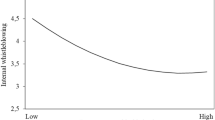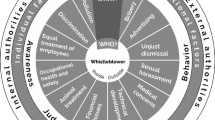Abstract
Examining intrapersonal factors theorized to influence ethics reporting decisions, the relation of self-efficacy as a predictor of propensity for internal whistleblowing is investigated within a US and Canadian multi-regional context. Over 900 professionals from a total of nine regions in Canada and the US participated. Self-efficacy was found to influence participant reported propensity for internal whistleblowing consistently in both the US and Canada. Seasoned participants with greater management and work experience demonstrated higher levels of self-efficacy while gender was also found to be influential to self-efficacy. These individual traits, although related to self-efficacy, did not directly relate to propensities for internal whistleblowing. The findings demonstrate that self-efficacy could represent an important individual trait for examining whistleblowing issues. Internal whistleblowing is becoming an important organizational consideration in many areas of North America, yet there is relatively little research on the topic. Organizations seeking effective internal reporting systems should consider the influence of self-efficacy along with its potential reporting influence. By empirically testing an under-examined component of theory related to internal whistleblowing, this effort contributes to management literature, extending the knowledge beyond a US context, and provides recommendation for managing individual bias with internal reporting systems.
Similar content being viewed by others
Reference
Adams S. (1963) Toward an Understanding of Inequity. Journal of Abnormal and Social Psychology 67(5):422–436
Bandura A. (1977) Self-Efficacy: Toward a Unifying Theory of Behavioral Change. Psychological Review 84(2):191–215
Bandura A. (1986) Social Foundations of Thought and Action: A Social Cognitive Theory. Prentice-Hall, Englewood Cliffs, NJ
Bandura A. (1997) Self-Efficacy. Prentice Hall, Englewood Cliffs, NJ
Barnett T. (1992) Will Your Employees Blow the Whistle? HR Magazine 37(7):76–79
Betz N., Hackett G. (1981) The Relationship of Career-Related Self-Efficacy Expectations to Perceived Career Options in College Women and Men. Journal of Counseling Psychology. 28(5):399–410
Betz N., Hackett G. (1986) Applications of Self-Efficacy Theory to Understanding Career Choice Behavior. Journal of Social and Clinical Psychology 4:279–289
Bollen K. (1989) Structural Equations with Latent Variables. John Wiley and Sons, New York, NY
Bollen K., Long J. (1993) Testing Structural Equation Models. Sage, Newbury Park, CA
Brabeck M. (1984) Ethical Characteristics of Whistleblowers. Journal of Research in Personality 18:21–53
Brislin R. (1981) Cross-Cultural Encounters: Face-to-Face Interaction. Pergamon, New York
Brislin R. (2000) Understanding Culture’s Influence on Behavior, 2nd Ed. Harcourt Brace Jovanovich, Fort Worth, TX
Brislin R., MacNab B., Bechtold D. (2004) Translation. Encyclopaedia of Applied Psychology 3:287–595
Brody R., Coulter J., Mihalek P. (1998) Whistle-Blowing: A Cross-Cultural Comparison of the Ethical Perceptions of US and Japanese Accounting Students. American Business Review 16(2):14–21
Brody R., Coulter J., Lin S. (1999) The Effect of National Culture on Whistle-Blowing Perceptions. Teaching Business 3(4):383–387
Bowman M. (2000) The Diversity of Diversity: Canadian – American Differences and their Implications for Clinical Training and APA Accreditation. Canadian Psychology 41(4):230–243
Busch T. (1995) Gender Differences in Self-Efficacy and Academic Performance Among Students of Business Administration. Scandinavian Journal of Educational Research 39:211–318
Chonko L., Hunt S. (1985) Ethics and Marketing Management: An Empirical Examination. Journal of Business Research 13:239–359
Courtemanche G. (1988) The Ethics of Whistle Blowing. The Internal Auditor 45(1):36–42
England P. (1979) Women and Occupational Prestige: A Case of Vacuous Sex Equality. Signs 5(2):252–265
Erez M., Early C. (1993) Culture, Self-Efficacy and Work. Oxford, New York, NY
Ewing D. (1983) Do It My Way or You’re Fired! Employee Rights and the Changing Role of Management Prerogatives. Wiley, New York, NY
Ferrell O., LeClair D., Ferrell L. (1998) The Federal Sentencing Guidelines for Organizations: A Framework for Ethical Compliance. Journal of Business Ethics 17(4):353–363
Fishbein M., Ajzen I. (1975) Belief, Attitude, Intensions and Behavior: An Introduction to Theory and Research. Addison-Wesley, Boston, MA
Fishbein M. (1979) A Theory of Reasoned Action: Some Applications and Implications. In: Howe H., Page M. (eds.), Nebraska Symposium on Motivation. University of Nebraska Press, Lincoln, Nebraska, pp 65–116
Geertz C. (1973) The Interpretation of Cultures. Harper-Collins, New York
Griffith D., Hu M., Ryans J. (2000) Process Standardization Across Intra and Inter Cultural Relationships. Journal of International Business Studies 60(1):303–325
Hackett G., Betz N. (1989) An Exploration of the Mathematics Self-Efficacy/ Mathematics Performance Correspondence. Journal for Research in Mathematics Education 20(3):261–273
Hearn S. (1999) Whistleblowing: Implementing and Employee Hotline. Management Accounting 77(2):35–37
Hofstede G. (1980) Culture’s Consequence: International Differences of Work Related Values. Sage, Beverley Hills, CA
Hofstede G. (1997) Cultures and Organizations: Software of the Mind. McGraw-Hill, London
Hofstede G. (2001) Culture’s Consequence: Comparing Values, Behaviors, Institutions And Organizations Across Cultures, 2nd Ed. Sage, Thousand Oaks, CA
Jex S., Gudanowski D. (1992) Efficacy Beliefs and Work Stress: An Exploratory Study. Journal of Organizational Behavior 13(5):509–517
Jex S., Bliese P. (1999) Efficacy Beliefs as a Moderator of the Impact of Work-Related Stressors: A Multi-Level Study. Journal of Applied Psychology 84(3):349–361
Johansen, D.: 2000, Public Service Whistleblowing Act. Legislative History of Bill S-13. Legislative Summaries, Library of Parliament. 18 January 2000. http://www.parl.gc.ca/common/bills
Jos P., Tompkins M., Hays S. (1989) In Praise of Difficult People: A Portrait of the Committed Whistleblower. Public Administration Review 49(6):552–561
Jubb P. (1999) Whistleblowing: A Restrictive Definition and Interpretation. Journal of Business Ethics 21(1):77–95
Kaplan B., Kleiner B. (2000) New Developments Concerning Discrimination for Whistle Blowing. Equal Opportunities. 19(6–7):75–78
Kaptein M. (1998) Ethics Management: Auditing and Developing the Ethical Content of Organizations. Kluwar, Dordrecht
Kaptein M. (2002) Guidelines for Developing an Ethics Safety Net. Journal of Business Ethics. 41(3):217–235
Keenan J. (1990) Upper-Level Managers and Whistleblowing: Determinants and Perceptions of Company Encouragement and Information about Where to Blow the Whistle. Journal of Business and Psychology 5(2):223–235
Keenan J., Krueger C. (1992) Whistle Blowing and the Professional. Management Accounting 74(2):21–25
King G. (2000) The Implications of Differences in Cultural Attitudes and Styles of Communication on Peer Reporting Behavior. Cross-Cultural Management 7(2):11–17
Lipset S. (1989) Continental Divide: The Values and Institutions of the US and Canada. C.D. Howe Institute, Toronto
Locke E., Latham P. (1990) A Theory of Goal Setting and Task Performance. Prentice Hall, NJ
Loeb S., Cory S. (1989) Whistleblowing and Management Accounting: An Approach. Journal of Business Ethics 8(12):903–916
McDonald G. (2000) Cross-Cultural Methodology Issues in Ethical Research. Journal of Business Ethics 27(1&2):89–104
McSweeney B. (2002) Hofstede’s Model of National Cultural Differences and their Consequences: A Triumph of Faith, a Failure of Analysis. Human Relations 55(1):89–118
Miceli M., Dozier J., Near J. (1991) Blowing the Whistle on Data Fudging: A Controlled Field Experiment. Journal of Applied Social Psychology 21(4):301–325
Miceli M., Near J. (1992) Blowing the Whistle. Lexington Books, New York, NY
Myers N., Feltz D., Short S. (2004) Collective Efficacy and Team Performance: A Longitudinal Study of Collegiate Football Teams. Group Dynamics 8(2):126–138
Near J., Miceli M. (1986) Retaliation against Whistle-Blowers: Predictions and Effects. Journal of Applied Psychology 7(1):137–145
Nevitte N. (1996) The Decline of Deference: Canadian Value Change in Cross-National Perspective. Broadview Press, Peterborough, OT
Nunnally J.C. (1978). Psychometric Theory. McGraw-Hill, New York, NY
Patel C. (2003) Some Cross-Cultural Evidence on Whistle Blowing as an Internal Control Mechanism. Journal of International Accounting Research 2:29–97
Quesqas F., Kleiner B. (2001) The Difficulties of Whistleblowers Finding Employment. Management Research 24(3–4):97–101
Rothschild J., Miethe T. (1999) Whistleblower Disclosures and Management Retaliation: The Battle to Control Information about Organization Corruption. Work and Occupations 26(1):107–128
Rotter J. (1966) Generalized Expectancies for Internal Versus External Control of Reinforcement. Psychological Monographs 80(1):1–28
Sagiv L., Schwartz S. (2000) A New Look at National Culture. In: Ashkianasy N., Wilderom C., Peterson M. (eds.), Handbook of Organizational Culture and Climate. Sage, Thousand Oaks, CA
Schwartz S. (1990) Individualism-Collectivism: Critique and Proposed Refinements. Journal of Cross-Cultural Psychology 21(2):139–157
Schwarzer R. (1994) Optimistische Kompetenzerwartung: Zur Erfassung einer personellen Bewaltigungsressource. / Generalized Self-Efficacy: Assessment of a personal coping resource. Diagnostica 40(2):105–123
Shelton S. (1990) Developing the Concept of General Self-Efficacy. Psychological Reports 66:287–994
Sherer M., Maddux J., Mercadante B., Prentice-Dunn S., Jacobs B., Rogers R. (1982) The Self-Efficacy Scale: Construction and Validation. Psychological Reports 51:663–671
Simpson J. (2000) Star-Spangled Canadians. Harper-Collins, Toronto, ON
Sims R. and J. Keenan: 1998, ‚Predictors of External Whistleblowing: Organizational and Intrapersonal Variables’, 17(4), 411–421
Sims R., Keenan J. (1999) A Cross-Cultural Comparison of Managers’ Whistleblowing Tendencies. International Journal of Value Based Management 12(2):137–151
Singer A. (1996) The Whistle Blower: Patriot or Bounty Hunter? Across the Board 29(11):16–22
Streiner D., Norman G. (1989) Health Measurement Scales: A Practical Guide to their Measurement and Use, 2nd Ed. Oxford University Press, New York, NY
Tavakoli A., Keenan J., Crnjak-Karanovic B. (2003) Culture and Whistleblowing: An Empirical Study of Croatian and United States Managers Utilizing Hofstede’s Cultural Dimensions. Journal of Business Ethics 43(1&2):49–64
Tavakolian H. (1994) Whistle Blowing: Preventative Strategies. Management Research News 17(1–2):1–12
Trevino L., Weaver G., Gibson D., Toffler B. (1999) Managing Ethics and Legal Compliance: What Works and What Hurts. California Management Review 41(2):131–151
Trompenaars F. (1993) Riding the Waves of Culture. Economist Books, London
Victor B., Trevino L., Shapiro D. (1993) Peer-Reporting of Unethical Behavior: The Influence of Justice Evaluations and Social Context Factors. Journal of Business Ethics 12(4):87–97
Vinten G. (1992) Whistle Blowing: Corporate Help or Hindrance? Management Decision 30(1):44–49
Westin A. (1981) Whistleblowing: Loyalty and Dissent in the Corporation. McGraw-Hill, New York, NY
Wise T. (1995) An Analysis of Factors Proposed to Affect the Decision to Blow the Whistle on Unethical Acts. Doctoral Dissertation. Louisiana Tech. University, Ruston, LA
Zellars K., Hochwarter W., Perrewe P., Miles A., Keiwitz C. (2001) Beyond Self-Efficacy: Interactive Effects of Role Conflict and Perceived Collective Efficacy. Journal of Managerial Issues 13(4):483–500
Author information
Authors and Affiliations
Corresponding author
Additional information
Brent R. MacNab is a faculty member in the discipline of International Business with the University of Sydney. Brent’s research interests focus on examination of cross-cultural and intra-cultural phenomena as related to management and human interaction issues like cultural intelligence, ethics management and workplace motivation. He has received two Fulbright Awards (Canada, 2002 and NAFTA focus 2003) for examination of his research in Canada, the U.S. and Mexico. In addition to faculty duties Brent also acts as a consultant to organizations examining issues related to cultural training and ethics management.
Reginald Worthley is a faculty member with the University of Hawai'i at Manoa where he teaches coursework in applied quantitative analysis. He specializes in survey research on various cross-cultural issues. Recent studies include a web survey quantifying motivational drivers in the Japanese workplace, a comparative longitudinal study of managerial values in six countries and a NAFTA study of cultural identity as related to defined areas of ethics management.
Rights and permissions
About this article
Cite this article
MacNab, B.R., Worthley, R. Self-Efficacy as an Intrapersonal Predictor for Internal Whistleblowing: A US and Canada Examination. J Bus Ethics 79, 407–421 (2008). https://doi.org/10.1007/s10551-007-9407-3
Received:
Accepted:
Published:
Issue Date:
DOI: https://doi.org/10.1007/s10551-007-9407-3




